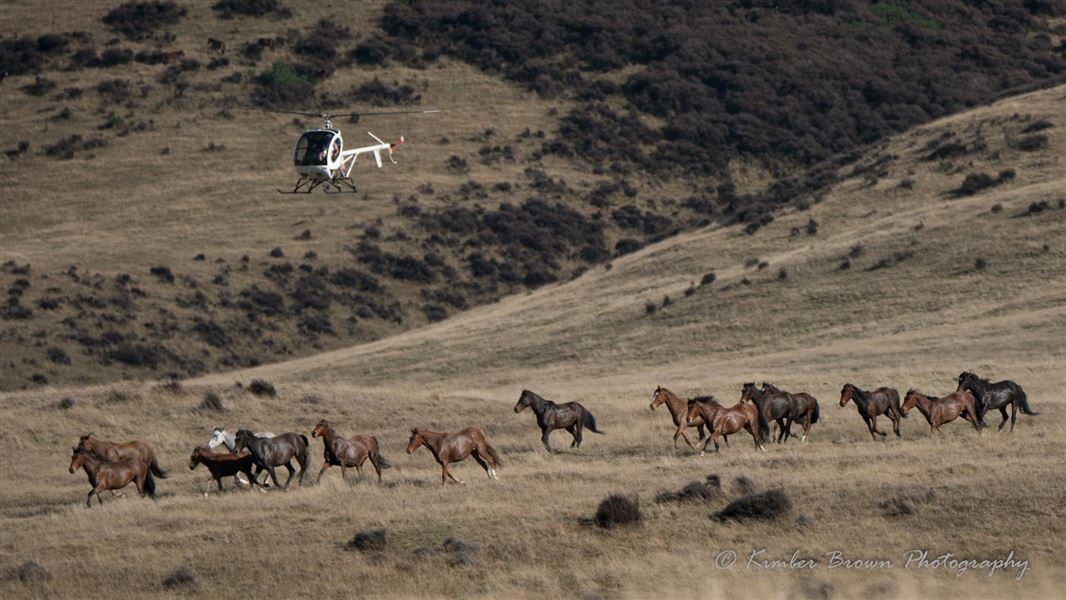Archived content: This media release was accurate on the date of publication.
Date: 20 March 2018
As many as possible will be homed but all horses not adopted will be destroyed.
The muster is held every two years by DOC to manage the herd at the sustainable level of 300 horses within the WMTA as recommended by the Kaimanawa Wild Horse Advisory Group. This number allows for horses in the herd to maintain best condition, and protects the fragile ecosystems unique to the Moawhango Ecological zone.
The re-homing of as many horses as possible is an important part of a successful muster says DOC Operations Manager Dave Lumley.
“Ideally all horses would be adopted, as was the case for the 100 horses mustered in 2016, however we know it’s a real challenge for the groups to find so many suitable homes.”
Dedicated not-for-profit group Kaimanawa Heritage Horses has taken on the task of finding new homes for the wild horses, and will be working hard over the next month taking applications and vetting potential homes.
Kaimanawa Heritage Horses only has applications for 56 horses to date and is hoping that the many other applications promised, will come to fruition. “With only two weeks left until applications close, there’s not a lot of time for interested parties to deliberate. It’s a real concern that some people may simply run out of time, resulting in potentially homed horses being trucked to the abattoir”, says KHH Muster Coordinator, Simone Frewin.
Kaimanawa horses are gaining favour among the equestrian community as highly competitive sport horses. They’re the perfect option for those who can’t afford to purchase a $25,000 purpose bred pony but want a chance to be competitive in that class of competition. Since numbers were reduced to 300 individuals in the wild herd, the condition of the horses and their final mature height, has improved immeasurably. “The fact that we’re seeing more Kaimanawa ‘horses’ now rather than just ponies means they’re more suited to a wider variety of riders. It’s devastating to think that many of these horses just won’t have a chance”, says Simone.
The number of horses to be removed was confirmed last week after the annual aerial survey. “With the herd in such good condition the reproduction rate is up at around 30% per year” says Lumley “the population has risen to nearly double the recommended number. A herd greater than 300 not only impacts on the fragile environment and the condition of the horses but also increases the risk of horse migration towards SH1/the Desert Road and the related public safety concerns.”
The unique tussock grassland where the horses roam contains threatened plants, including at least 16 species in the New Zealand Threat Classification System, some of which are found nowhere else in the world. Many of these plants occur in habitats that can sustain very little disturbance from horses.
For media enquiries contact:
Email: media@doc.govt.nz
Simone Frewin, Kaimanawa Heritage Horses
Mobile: +64 2173 8346
Email: simone@kaimanawaheritagehorses.org
Background Information
- The Kaimanawa Horse Management Plan has three core objectives:
- to ensure the welfare of the horses is dealt with appropriately,
- to promote the sustainability of the natural features and ecosystems of the Moawhango Ecological District, with respect to Kaimanawa wild horse impacts; and
- to manage the Kaimanawa wild horse herd at a sustainable level
- The Kaimanawa Wild Horse Advisory Group provides advice to the Department of Conservation on implementing the management plan. It consists of representatives from New Zealand Defence Force, DOC, Kaimanawa Heritage Horses, Kaimanawa Wild Horse Preservation Society, Ngati Rangi, RNZSPCA, Forest & Bird, NZ Veterinary Association and adjoining landowners.
- Kaimanawa Heritage Horses (KHH) is a charitable society run by a volunteer group of passionate horse people; dedicated to the care and welfare of Kaimanawa horses both domestically and in the wild. KHH are advocates for the horses and work closely with DOC and other interested groups on the welfare and future of the Kaimanawa horses in the wild.
Prior to each muster The group search for suitable homes and complete home-checks to place as many horses as possible. KHH actively support our members and their domestic Kaimanawa horses through our Welfare team, Area Reps, magazine, education and training, Annual Shows and Ribbon Days. Member generosity, through membership and donations, is the group’s primary funding source.
